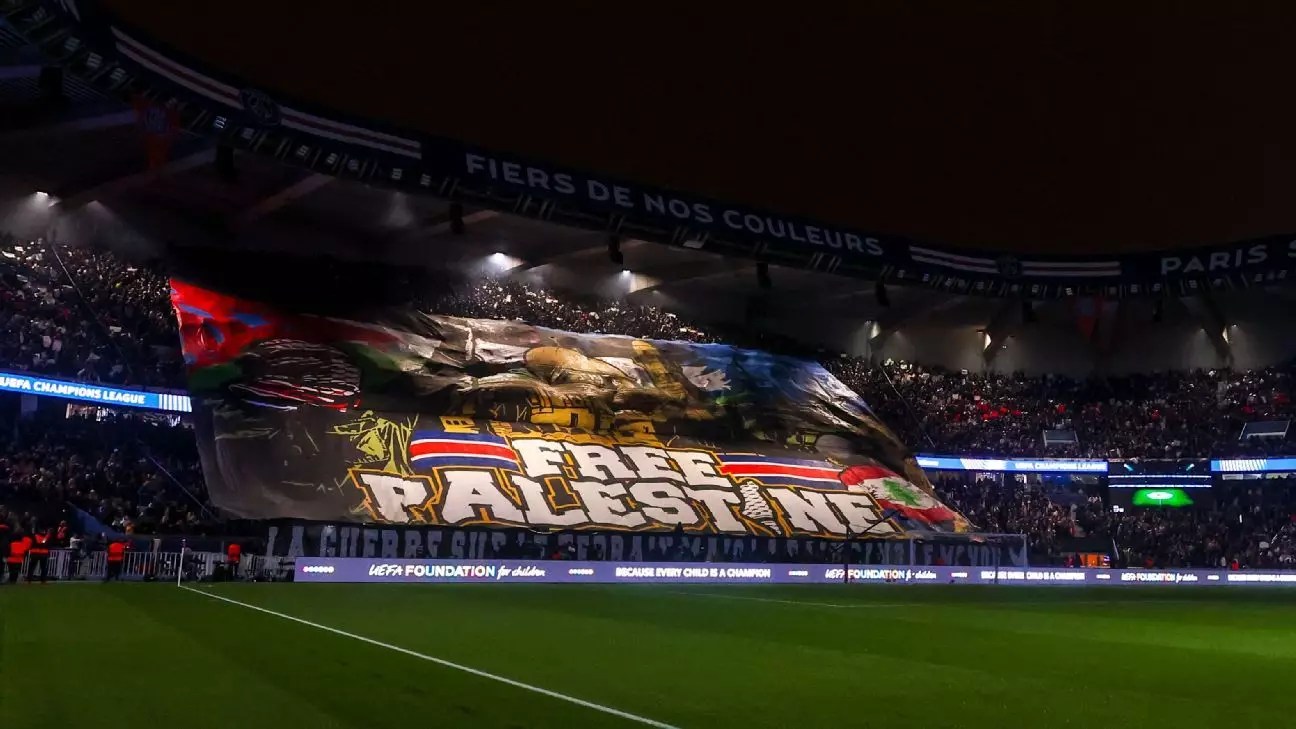In a remarkable display of activism, fans from the Auteuil Kop section of Paris Saint-Germain (PSG) made headlines during a recent Champions League match against Atlético Madrid. Just before the game commenced, they revealed a striking banner that proclaimed “Free Palestine,” accompanied by a thought-provoking statement: “War on the pitch, but peace in the world.” This message was not lost amidst the excitement of the match; it directly reflected the political tensions surrounding not just the sporting event, but current global conflicts, particularly in Gaza.
The fans’ action occurred just days before France’s national football team was scheduled to face off against Israel in a Nations League match. The juxtaposition of these significant events raised the stakes for both athletes and spectators. By addressing such a controversial topic in a football stadium, the supporters highlighted that the lines between sports and politics are often blurred, particularly in a city known for its activism and diversity.
In response to the display, PSG asserted that they were caught off guard by the fans’ political demonstration, emphasizing their stance against such messages in their stadium. The club insisted that the Parc des Princes should remain a sanctuary for soccer, free from political disputes. However, there is a palpable tension in that assertion: the world of sports increasingly intersects with political issues, and denying that reality might isolate the club from its fan base and broader societal conversations.
Critics argue that PSG’s response reflects a broader unwillingness among sports organizations to engage with contentious social and political issues. While the club’s intention to maintain a shared atmosphere for sports is commendable, it poses a significant question: how do organizations balance the freedom of expression of their fans with the desire for a politically neutral space? The dichotomy can lead to feelings of alienation, especially among groups who feel passionately about global injustices.
The French government, represented by Interior Minister Bruno Retailleau, swiftly condemned the display. The remark that this act was “unacceptable” underscores the tension between public sentiment and government policy on contentious matters. Retailleau’s suggestion of possible sanctions against PSG evokes past incidents wherein football clubs faced penalties for similar displays of political expression, such as Celtic receiving a fine for fans waving Palestinian flags.
This incident has stirred up a complex dialogue about the role of sports in society, particularly in France, where security concerns are heightened. The nation is home to a diverse population comprising significant Jewish and Muslim communities, which complicates the public’s response to political statements made in sports venues. The upcoming match between France and Israel at Stade de France has already raised concerns regarding safety and inclusivity, revealing that the ramifications of the fans’ banner extend far beyond the immediate sporting context.
While PSG’s Auteuil Kop fans highlighted urgent global issues through their protest, it leaves the football club, the fans, and the government grappling with the implications of merging sport with activism. As the world of sports increasingly engages with the pressing social issues of our time, it begs the contemplation of how the beautiful game can serve as a platform for voices demanding change, all while navigating the inherently tumultuous waters of communal passion and political discourse. The developments in Paris exemplify the powerful intersection of sport and society, compelling us to reflect on what we value in both arenas.


Leave a Reply